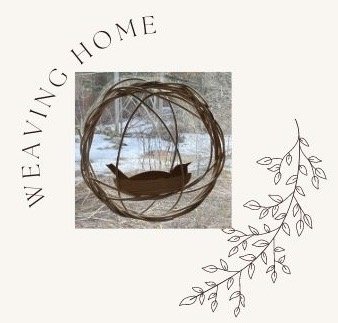We have a great retreat on November 7th and here are some haiku from our participants:
Covering the rock
Yellow blanket over moss
Tamarack needles - Sam Pendergrast
Look above, a web
Reaching for sun, all niches filled
Rising out of earth - Marjorie Hughes
A rock, not so solid
A growing place for lichens
Dissolved into earth - Marjorie Hughes
I don’t know about you, but November can be a hard month for me. It is such an in-betweenmonth; is it fall or is it winter? We don’t know, November doesn’t know. I hear people say that all the time who live here, I love the fall, but November is so gray and depressing, it can’t make up its mind. We have rhythms in our lives, like the ebb and flow of the sea, like summer and winter, like light and darkness. Rhymes that invite us to work, to rest, to ponder, to let go, to hold on, to sleep, to dream. I dream of being in rhythm with the seasons, of resting in the winter, of working hard in the summer, but often it is hard to get in touch with what we are really called to do and be.
In November, the farms have been harvested, Star has things hanging from her walls drying for the winter. Maybe because we want everything to be summer all the time - hurry up, grow, produce - I have trouble sitting down and just letting life be. Even our grocery stores stock strawberries that have been shipped from summer climates so we can have shortcake in December. Do we really needfresh strawberry shortcake in December? Is it really the time and the place? That is a simple example of how we want everything all the time without paying attention to nature’s rhythm. And how we want things now!
November 1st we changed to eastern standard time, leaving daylight savings time behind, and it seems all light behind too. We not only awake in darkness but our drive home is very dark.. Barbara Brown Taylor’s book “Learning to Walk in the Dark: talks about our fasciation with light. She says: “it seems clear that eliminating darkness is pretty high on the agenda, not just physical darkness, but also metaphysical darkest, which includes psychological, emotional, relational, and spiritual darkness.” Is it really in our best interest to eliminate darkness from our lives? She concludes that we need that dark as much as we need the light.
St. John of the Cross talked about the Dark Night of the Soul. I always thought that meant that it’s like we feel alone, there is no presence ofGod, and there are not answers, sort of like being in a deep depression. Like stumbling around in the dark without a night light.
Last November, that idea resonated with me, it seemed that the darkness and the gloom began to seep into my being, made me want to just stop, to run away, and to have no hope that there was anyway out. But, John of the Cross did not see the dark night as a negative thing, but as a transition from one way of knowing and relating to God, to another, deeper way. His life was not pretty. He was locked away, his teachings were forbidden, yet he continued to write and try to make changes in his order. Don’t you love the passion of the reformers, they just kept on against all the forces that tried to stop them. He used the pain and suffering in his life to grow into greater relationship with God.
How can we cultivate that kind of passion, how can we be more in line with the inner light that is in all of us? How can we embrace the darkness so it becomes a means to a deeper understanding of who we are and our relationship to the sacred?
In one of Richard Rohr’s daily meditation he said: “Astrophysicists tell us that 95% of the known universe is dark energy and dark matter and seemingly empty space--not open to our analysis it seems. Yet we now know that all that darkness is objectively not darkness at all; what looks to the human eye like darkness is actually filled with billions of neutrinos--which are light. This sounds to me like John's Gospel: "A light that shines on in the dark, a light that darkness cannot overcome" (1:5).” the darkness has much to teach us, when we stop fighting it, and let those billions of tiny lights begin to teach us to see.
A Taize Chant goes: “Within our darkest night, you kindle the fire that never dies away, never dies away.”
So it is in the month of November that we come face to face with darkness, and begin to befriend if, because it will be with us for a long time, as we look more deeply into the darkness, we begin to learn of the hidden revelations that is has to teach us. Sam sent me this Mary Oliver poem:
Someone I loved once gave me
a box full of darkness.
It took me years to understand
that this, too, was a gift.
- Mary Oliver

